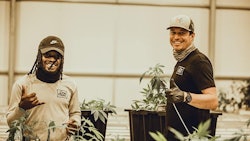
Bill and Dustin Freas know what it takes to build and operate a successful cannabis business, and the father-and-son team plan to apply lessons learned from other markets to their latest venture, Harvest Care Medical, which recently became one of 10 companies to win a medical cannabis cultivation license in West Virginia.
The Freases first entered the cannabis space six or seven years ago, when they launched Grow West, a medical cannabis cultivation and dispensary operation in Dustin’s hometown of Cumberland, Md.
“It was a real gamechanger for our post-industrial, Rust Belt community,” Dustin, Harvest Care Medical’s chief development officer, tells Cannabis Business Times and Cannabis Dispensary. “We were very successful here with our family and our partners at Grow West.”
The Freases have since secured cultivation licenses in additional states, as well, including Connecticut, Minnesota, Pennsylvania, Missouri and Virginia. When West Virginia Gov. Jim Justice signed the state’s medical cannabis legislation into law in 2017, Bill and Dustin embarked on a nearly four-year journey to build their latest operation in Bill’s home state.
The cultivation license allows Harvest Care Medical to build out two grow facilities, and the company plans to locate these operations in Harrison County, right outside of Bridgeport, and in Kearneysville, which is located in Jefferson County.
“My father and I spent about a four-year period building relationships in Harrison County, Jefferson County and across the state,” Dustin says. “We have a fantastic group of founders, partners and owners that are large majority West Virginia residents and just great dynamic West Virginia people in general.”
The Harvest Care Medical team also submitted two processing license applications, as well as 10 dispensary applications, with the hope of becoming vertically integrated in West Virginia.
“It’s pedal to the metal right now,” Dustin says, adding that the company’s Harrison County facility will be the first one to open.
While the planning and zoning phases can take up to six months in Jefferson County, Dustin says the build-out in Harrison County will be more streamlined, allowing Harvest Care Medical to get product to market sooner—and allowing the company to meet a state requirement that cultivators launch operations within six months of receiving their licenses.
“We’ll finish our architecture, hire general contractors, build relationships and partnerships with the county in Harrison County, and it’s a more centralized distribution point,” he says. “We can get product to market, and our goal is to be first or second to market, as we are in most states that we play in. We want to create jobs. We want to get medication to patients, in particular in West Virginia, which has a really tremendous opioid issue. I know the big impact we can have in really going to war with this opioid epidemic.”
Harvest Care Medical is committed to the medical benefits of cannabis, adds Bill, the company’s CEO, and the Freas family business has always been rooted in healthcare, with past ventures in the fields of physical therapy and physical medicine.
“We view it as healthcare, and in a lot of the states, it’s under the exact same regulations that we have to operate our nursing homes and physician practices under,” Dustin says.
Leveraging Existing Relationships
Grow West has provided the Harvest Care Medical team with many great collaborations, Dustin says, and the two companies are only 90 miles apart, which means that new hires for the West Virginia operations can train at the Maryland facilities.
“We [also] have a fantastic partnership and relationship with Merida Capital Partners, who in my eyes is the elite private equity fund in the cannabis space,” Dustin says. “They just bring a tremendous amount of national and international resources across the board. We basically have a lot of depth with the relationships and abilities that we’ve built with some of these folks, and that’s critical.”
“My colleague Kevin Gibbs of Merida Capital Partners and I are thrilled to be involved in the founding and success of Harvest Care Medical,” Merida Capital Partners Managing Partner Mitch Baruchowitz tells Cannabis Business Times and Cannabis Dispensary, adding that he has worked in the legal cannabis industry for nearly a decade and is very familiar with West Virginia’s regulations.
“The truth is, everybody thinks when you go to work in cannabis that it’s a wildly different business operation. The reality is it’s not. It’s just a pharmaceutical manufacturing operation, and all the same business principles and dynamics apply, whether it’s human resources or accounting.”
-Dustin Freas, Chief Development Officer, Harvest Care Medical
Merida Capital Partners not only invested in Harvest Care Medical, but also advised the company on the application process and helped the team develop a roadmap for production in West Virginia.
With this support behind them, the Freases plan to hire locally for its West Virginia operations, and will host local job fairs, as well as work with local organizations such as the local chambers of commerce and universities, to find and train employees.
“We’re looking for people who want to work, that are honest [and] have some solid skillsets,” Dustin says. “The truth is, everybody thinks when you go to work in cannabis that it’s a wildly different business operation. The reality is it’s not. It’s just a pharmaceutical manufacturing operation, and all the same business principles and dynamics apply, whether it’s human resources or accounting.”
The Freases plan to provide ongoing training and education to the Harvest Care Medical staff, Dustin adds, to keep up with the constantly evolving industry.
“It’s changing, so we have to stay on the forefront to constantly be training and educating our staff [on] new compliance initiatives, new grow techniques [and] new process formulations that are better for the patients,” he says. “You have to keep pressing the envelope.”
A Desirable New Market
Bill says West Virginia was an attractive market for him and his son for a number of reasons, the main one being their belief that medical cannabis can make a difference in the opioid crisis and the state’s economy.
“These areas are struggling,” he says. “We can bring real jobs … with health care benefits. … It’s an opportunity to create a living wage for people. We think that’s important.”
“Like Oklahoma, which boasts one of the country’s best medical markets on a per capita basis, [West Virginia] is a state which has really suffered from the opioid crisis,” Baruchowitz adds. “Patients will finally have less toxic options to address their pain. The opportunity to shift patient treatment is incredible, and from an economic perspective, we think the breadth of West Virginia’s market is going to surprise people much like Oklahoma’s due to a variety of demographic factors.”
The Harvest Care Medical team has lobbied for opioid replacement legislation in the states in which they operate, advocating for laws that allow patients to trade their opioid prescription for the equivalent of medical cannabis.
Henderson County reminds the Dustin of his hometown of Cumberland, Md., in that the community has lost much of its industry, jobs and population over the past 20 to 30 years. He and his father aim to bring economic relief to the region, much like Grow West did in Cumberland.
“We’re local, [but] it’s not our first rodeo,” Dustin says. “This is our fourth or fifth state now, and quite frankly, it’s the best state in my eyes that we’ve ever assembled with the right local team, all of the high-level resources around us through Grow West, [and] Merida Capital Partners and our 47 portfolio companies. … We have the right players at the table, which provides us a tremendous amount of resources and efficiency.”
Eying a Spring Launch
The Freases want Harvest Care Medical’s Jefferson County cultivation facility to be fully approved and operational by May, with plans for a brand-new, 35,000- to 40,000-square-foot indoor operation already under way. If the company receives a processor license, the processor facility will be co-located in the same building, Dustin says.
He expects West Virginia to experience many of the same growing pains as any new medical cannabis market, and the Harvest Care Medical team remains focused on building out its facility to get product to market as quickly as possible.
“Each stage of the licensing process has its challenges, but the biggest initial challenge for licensees is building their production facility,” Baruchowitz says. “Some operators will lack capital resources. Others will have to amend their plans. The biggest hurdle can arise if local operators have not gained pre-plan approval, which could mean they will be delayed by months. Harvest Care Medical knew this element was essential because of our previous experience in many states, so we are ‘shovel ready’ in terms of facility construction.”
“For us, that’s the biggest hurdle, … then it’s on the dispensary side,” Dustin adds. “Do we win a few dispensaries or not?”
Research will play an important role in the company’s operations, he adds, and the team plans to work with the local hospital systems and physicians’ offices to advance both product development and the scientific knowledge of cannabis overall.
“Our mid-term to long-term goals are pretty simple: We want to have the best quality product in the state,” Dustin says. “We want to hire as many people as we can and grow this thing as large as we can in the state of West Virginia."

























